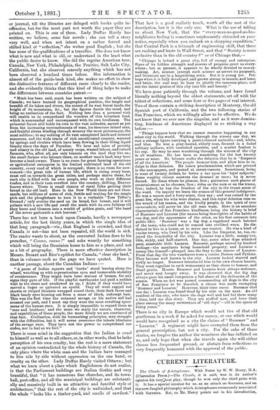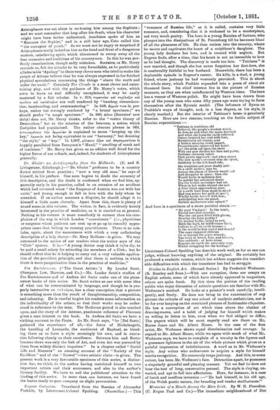CURRENT LITERATURE.
The Clouds of Aristophanes. With Notes by W. W. Merry, M.A. (Clarendon Press.)—The Clouds, it is said, was in its author's opinion his very;best play, though he won only the third prize with it. It has a special interest for us, as an attack on Socrates, and on the new-fangled philosophy which Aristophanes erroneously associated with Socrates. But, as Mr. Merry points out in his introduction, Aristophanes was not alone in reckoning him among the Sophists ; and we mast remember that long after his death, when his character might have been better understood, Aeschines spoke of him as "Socrates the Sophist," and in a still later age, Cato called him "the corrupter of youth." So we must not be angry or surprised if Aristophanes really looked on him as the head and front of a dangerous modern, unbelieving spirit, which threatened to sweep away all the best memories and traditions of his countrymen. In this he was per- fectly conscientious, though sadly mistaken. Socrates, as Mr. Merry reminds us, felt the attacks to be very formidable, as he particularly alludes in his "Apology" to those very clever men who tried to make the people of Athens believe that he was always engrossed in far-fetched physical speculations concerning the things "above the earth and under the earth." Certainly The Clouds is a most clever and enter- taining play, and with the guidance of Mr. Merry's notes, which seem to leave no real difficulty unexplained, it may be easily mastered by a fair scholar. In v. 318, T€ paTetav nal trspiltstiv ,cal at:wilco, Kai aaTtikrpkov are well rendered by "humbug, circumlocu- tion, bamboozling, and overmastering." In 349, &with, ewe is, per- haps, rather too strongly rendered by "a brutal specimen ;" we should prefer "a rough specimen." In 380, c isess (Socrates' new deity) does not, Mr. Merry thinks, refer to the "vortex theory of Democritas," but to the rotation of the heavens, a notion which Euripides had popularised. The rather obscure phrase in 969, irrtivaiaivous rlv iipihoria.v is explained to mean "keeping up the key," app.ovia not being equivalent to our "harmony," but denoting "the style," or "key." In 1,007, piAaaos tiCenv Kul Zurpaypoolivns is happily paralleled from Tennyson's "Maud," "smelling of musk and of insolence." Mr. Merry has given us an edition well fitted for the higher forms of our schools, and, indeed, for students of Aristophanes generally.































 Previous page
Previous page